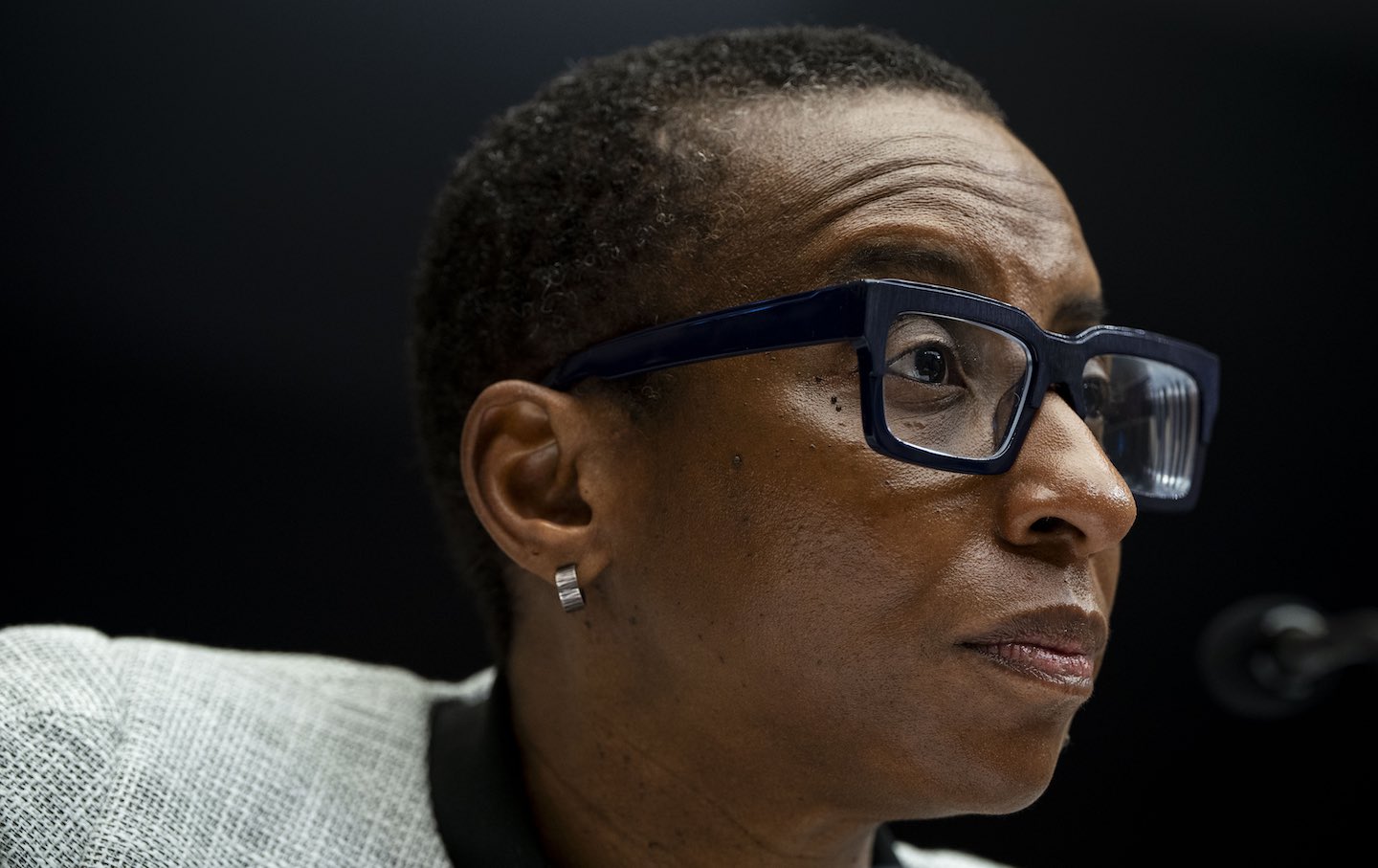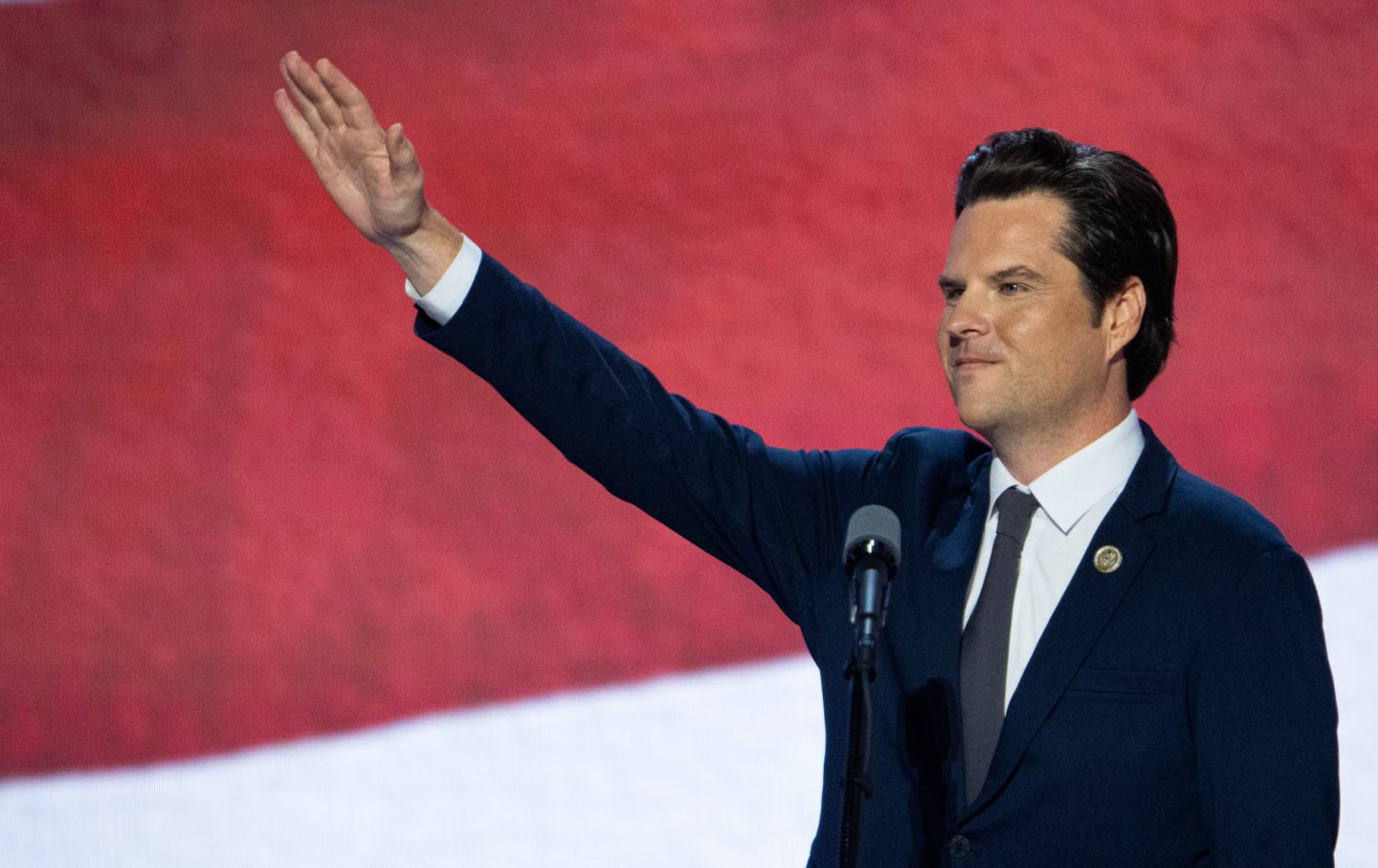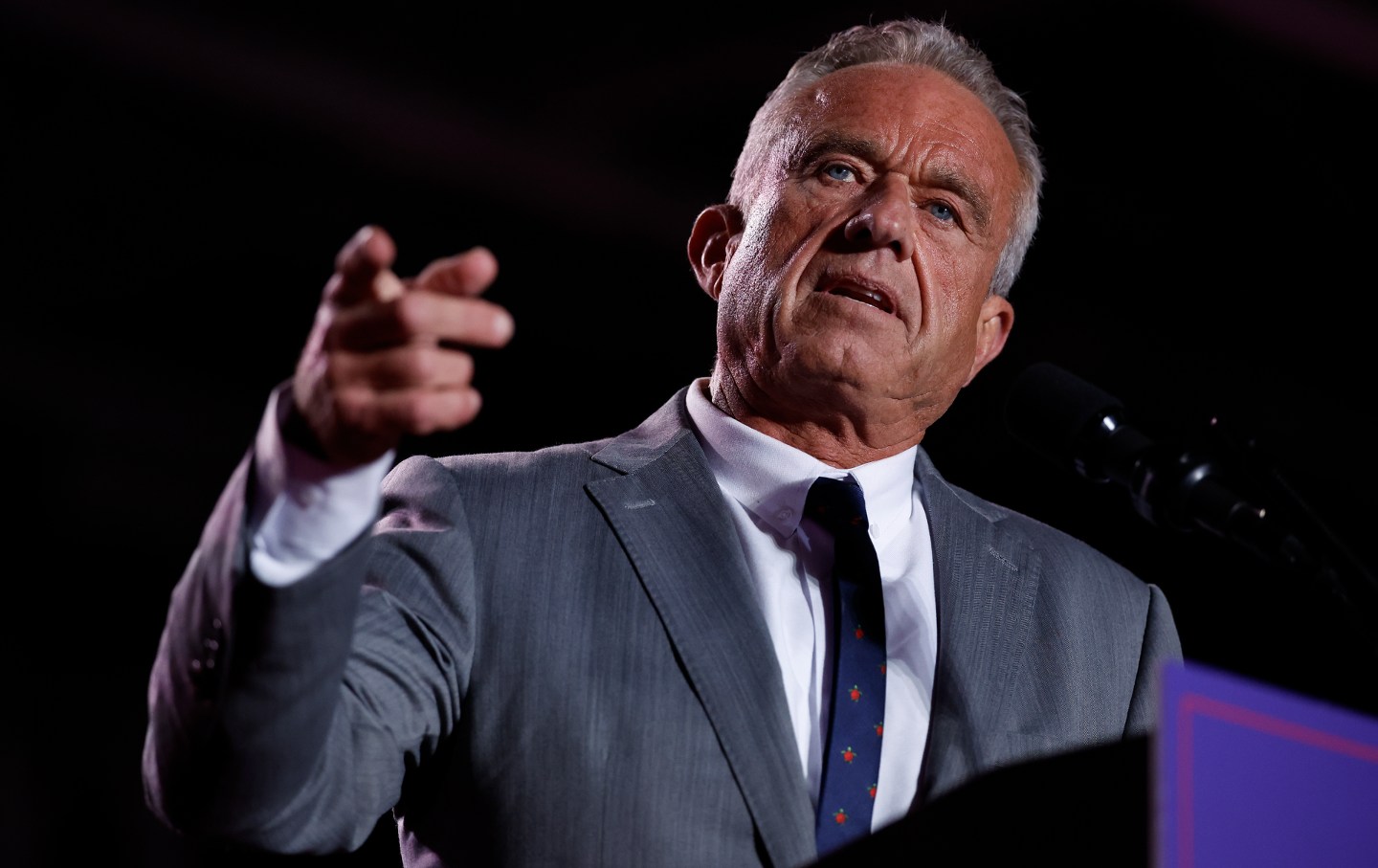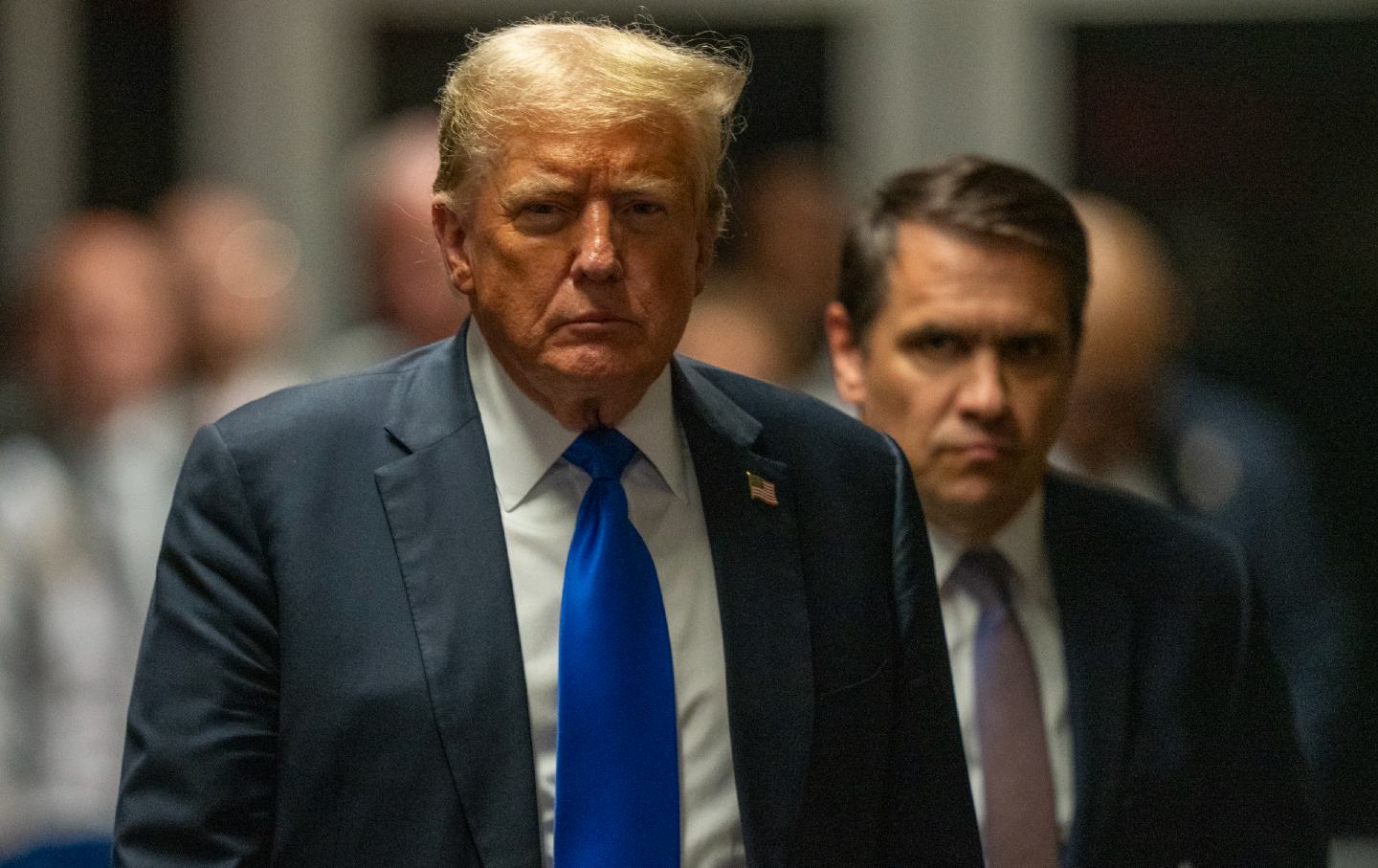Even Elite Institutions Like Harvard Aren’t Free From the Culture War
In the wake of congressional hearings on antisemitism, a right-wing campaign to oust Harvard President Claudine Gay maneuvered its pretext into victory.

Claudine Gay, president of Harvard University, during the House Education and the Workforce Committee hearing in Washington, D.C., in December.
(Haiyun Jiang / Bloomberg)The GOP Congress is distinctly talent-challenged in many respects, but it can claim one niche skill: toppling high-powered leaders. First, of course, the Republican conference practiced on itself, kneecapping Speaker Kevin McCarthy in an historic motion-to-vacate vote, and then taking three weeks to alight on Mike Johnson as McCarthy’s more fire-breathing spiritual successor. Then, after a ballyhooed and demagogic hearing before North Carolina Representative Virginia Fox’s Education and Workforce Committee on the alleged scourge of antisemitism in elite American colleges, University of Pennsylvania President Liz Magill stepped down, as one of the school’s premier donors threatened to withdraw a $100 million gift. Now, Harvard University President Claudine Gay, who appeared alongside Magill and MIT President Sally Kornbluth, has tendered her resignation amid a growing plagiarism scandal.
Gay’s resignation came in the wake of a report in the Washington Free Beacon about six fresh charges of plagiarism. These involved two nearly verbatim, and uncited, passages in a journal article that Gay lifted from the work of University of Wisconsin political scientist David Canon. The school’s governing board classified the other alleged instances of plagiarism in Gay’s published work as unfortunate acts of “inadequate citation,” but the cumulative effect of the charges was becoming onerous. As Free Beacon reporter Aaron Sibarium notes, the charges now encompass eight of Gay’s 17 published works.
Ivy League inquisitors in Congress wasted little time exulting. Elise Stefanik, one of the most aggressive pursuers of the three college heads in December’s hearing, took to social media to pick up where she left off, thusly:
The resignation of Harvard’s antisemitic plagiarist president is long overdue. Claudine Gay’s morally bankrupt answers to my questions made history as the most viewed Congressional testimony in the history of the U.S. Congress. Her answers were absolutely pathetic and devoid of the moral leadership and academic integrity required of the President of @Harvard. This is just the beginning of what will be the greatest scandal of any college or university in history. Our robust Congressional investigation will continue to move forward to expose the rot in our most “prestigious” higher education institutions and deliver accountability to the American people.
Of course, Gay’s light-fingered attribution practices are a long way from the greatest higher-ed scandal in history; they’re not even the greatest recent Harvard scandal, as Michael Massing noted in his Nation piece on human rights advocate Kenneth Roth’s withdrawn Kennedy Center fellowship on grounds of—wait for it—excessive criticism of Israel. (Roth’s fellowship was later restored in the wake of Massing’s reporting.) Still, Gay’s shoddy scholarship was troubling, and clearly represented a chronic source of embarrassment that the school could ill afford to keep dodging amid all the rancor stirred up in Fox’s committee hearing.
The larger lesson of Gay’s departure, though, should give pause to anyone who still harbors fond reveries that intellectual inquiry should not follow basic dictates of party agitprop. For all the right-wing agita over scholarly standards and the neglected mandate of “viewpoint diversity,” the crusade against Gay, like the one preceding it at Penn, was a raw ideological putsch. Manhattan Institute fellow Christopher Rufo, who first publicized the Gay plagiarism charges, laid out the whole MO from the outset, in a tweet two weeks ago: “We launched the Claudine Gay plagiarism story from the Right. The next step is to smuggle it into the media apparatus of the Left, legitimizing the narrative to center-left actors who have the power to topple her. Then squeeze.”
The urgency of this mandate was clear in the right’s ready abandonment of its earlier posture of free-speech absolutism in the recursive war on campus wokeness. Suddenly, the timorous replies that the university heads tendered under Stefanik’s badgering were ticketed to meet with real-world consequences, just as left partisans in the culture war had long said they should.
It mattered even less that the three presidents’ reluctance to denounce (purely hypothetical) speech singling out Jewish students for eliminationist rhetoric itself came from a risk-averse directive from the trio’s manifestly inept legal advisers to steer clear of any statement suggestive of a free-speech clampdown.
No, blood was in the water, and the Stefaniks and Rufos of the world gleefully lunged. But the real scandal here goes beyond standard-issue hypocrisy and opportunism from the right. What’s instructive here is that, in lying prostrate before such inquisitions, moneyed institutions of higher learning can no longer clearly articulate or understand what their intellectual missions really are. Just as the restive donors at Penn made Magill’s tenure untenable, so did the assault on Harvard’s most hotly coveted export—academic prestige—claim Gay’s presidency. But the two episodes, taken together, should remind us of a critical larger truth: For the lead institutions charged with babysitting the country’s rising ruling class, the virtue of moneyed agenda-setting must always be encased in the carapace of high scholastic achievement; when the latter gives way too abruptly, the former is exposed in the harsh light of day. That was the object lesson of the Kenneth Roth debacle, and was even more plainly the legacy of Gay’s best-known predecessor, Larry Summers, who ran the school from 2001 to 2006.
Summers fell afoul of traditional leftish constituencies at Harvard for disparaging the math and science acumen of female students and belittling the scholarship of Cornel West. But his investment-pandering portfolio was both his principal calling card and a key cause of his eventual undoing. During the early aughts, Summers engineered a series of disastrously timed derivative swaps and hedge fund deals that left the school’s endowment hemorrhaging 27 percent of its value during the 2008 meltdown—a loss of more than $10 billion. Meanwhile, a Russia initiative spearheaded by longtime Summers crony Andrei Schleifer had gone under in a blaze of corruption; only a 2006 settlement of at least $31 million with the feds kept Schleifer and Harvard clear of charges of conspiracy to defraud the US government and breach of contract, respectively. Summers of course then proceeded to fail upward into a post as the Obama White House’s head of the Council of Economic Advisers, proving definitively that those who can’t invest honestly make policy. And after spending the better part of the past year urging worker-punishing macroeconomic policies to forestall a recession that never came, Summers has returned to his natural habitat, in a Kennedy School sinecure.
It’s doubtful that Gay will be in for a similar soft Cambridge landing, given the latest burst of adverse publicity that’s pushed her out. But it’s worth lingering over the Summers career arc here, for a rare bright-line, Ivy League–branded lesson in how the world really works. It doesn’t ultimately matter so much to the lords of academic privilege whether or not you’ve engaged in minor academic pilferage; no, to hit the big time, you really have to commit institutional larceny on a far grander scale.
We cannot back down
We now confront a second Trump presidency.
There’s not a moment to lose. We must harness our fears, our grief, and yes, our anger, to resist the dangerous policies Donald Trump will unleash on our country. We rededicate ourselves to our role as journalists and writers of principle and conscience.
Today, we also steel ourselves for the fight ahead. It will demand a fearless spirit, an informed mind, wise analysis, and humane resistance. We face the enactment of Project 2025, a far-right supreme court, political authoritarianism, increasing inequality and record homelessness, a looming climate crisis, and conflicts abroad. The Nation will expose and propose, nurture investigative reporting, and stand together as a community to keep hope and possibility alive. The Nation’s work will continue—as it has in good and not-so-good times—to develop alternative ideas and visions, to deepen our mission of truth-telling and deep reporting, and to further solidarity in a nation divided.
Armed with a remarkable 160 years of bold, independent journalism, our mandate today remains the same as when abolitionists first founded The Nation—to uphold the principles of democracy and freedom, serve as a beacon through the darkest days of resistance, and to envision and struggle for a brighter future.
The day is dark, the forces arrayed are tenacious, but as the late Nation editorial board member Toni Morrison wrote “No! This is precisely the time when artists go to work. There is no time for despair, no place for self-pity, no need for silence, no room for fear. We speak, we write, we do language. That is how civilizations heal.”
I urge you to stand with The Nation and donate today.
Onwards,
Katrina vanden Heuvel
Editorial Director and Publisher, The Nation








